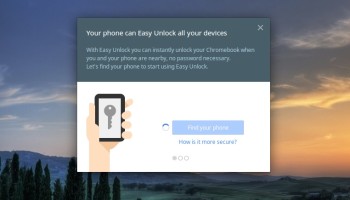
Sleek new smartwatches, a revamped Android TV and an early look at the revolutionary new ‘Android L’ release were the attention grabbing announcements at this week’s I/O summit. But Google’s Chrome OS also managed to draw a few ‘wows’ of its own.
Sundar Pichai, the Senior VP of Chrome, Android and Apps at Google, used the latter stages of the inaugural keynote address to demo a handful of new features coming to the company’s web-centric operating system.
Lazy Easy Unlock
 The first to get a mention was ‘Easy Unlock’, a proximity-based way to unlock Chrome OS without having to manually sign in.
The first to get a mention was ‘Easy Unlock’, a proximity-based way to unlock Chrome OS without having to manually sign in.
“Users almost always have a smartphone with them. We want to connect these experiences together,” Sundar explained. Using some clever, contextually aware APIs in Android L, the easy unlock feature means you can sit next to your Chromebook with your phone in your pocket or bag and have it ‘unlock’ automatically and seamlessly.
‘Chromtinuity’
But unlocking the door isn’t where the cooperation between Mountain View’s two operating systems will end. Android will be stepping inside.
The upcoming Android L refresh will integrate with Chrome OS in a way not too dissimilar to Apple’s Continuity.
Android will be able to relay incoming call alerts, text messages and low battery warnings to the Chrome OS desktop through the Chrome Notification Centre.
There’s no word on if these notification will be ‘actionable’ (e.g., answer a call alert from your desktop or reply to a text message) but since this work is still in the early stages, never say never.
Android Comes to Chrome OS
But for all the innovation (I’ve chosen to skip over ‘Material Design’, a new design language for all of Google’s platforms) the biggest ‘wow’ — as well as the one to cause the biggest head scratch — came towards the end of the pitch: Android applications running on the Chrome OS desktop.
Pundits have long posited that a merging of Google’s two operating systems was an inevitable conclusion. Google has always insisted that each OS has its own unique benefits, but that some shared ‘commonality’ between them was likely to happen at some point.
I/O saw the biggest step towards a unified partnership with a demo of three Android apps running on a Chromebook. Official Android applications for Evernote, Vine and Flipboard were shown off in their various tablet and mobile form factors, with launcher icons in the Aura app shelf and native Chrome OS windowing appearing around all.
The apps can access local hardware and files, meaning you can, for example, film a Vine using your Chromebook webcam, or paste links and other content from the Chrome browser straight into the Evernote app and have it sync back to the same app running on your tablet.
What’s not clear is precisely how this is possible. At one stage Sundar used the word ‘port’ to describe the apps as they ‘run within your Chromebook’. Is it down to some clever Google Cast mirroring? Or is it a lightweight emulator at work? That we just don’t know at present.
Sundar did stress that the project was still in the ‘early stages’ of development. It may be a while before we learn more about the implementation or potential limitations in scope. But it doesn’t seem like it is just a novelty in the eyes of Google, with Pichai saying:
“Our goal is to bring your favourite Android applications to your Chromebook in a thoughtful manner. We want this to be intuitive for users. These were built for Android…for the phone…We want them to work with a mouse and keyboard, and for developers to [have to do little to get them working]”
Summary
The Google I/O keynote clearly, cleanly and succinctly made Android the centre of everything we do — the sun that the watches on our wrists, the computers in our cars, the way we watch TV all orbit around.
Even the Chrome OS features listed above and highlighted by Google in the keynote pivot on Android.
But in showing that they can work together to make our everyday lives easier and more productive, Google is sending out a powerful, positive message to developers: Chrome OS is here to stay.

